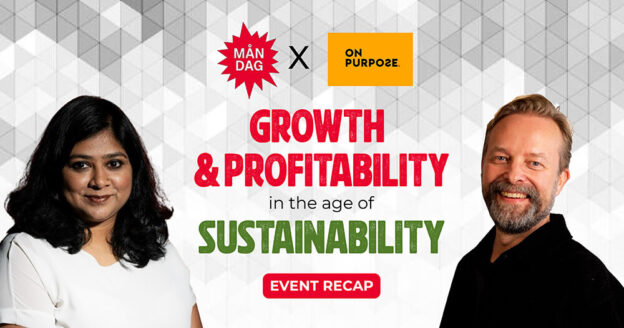So. You may have seen that we recently hosted a Sustainability Roundtable on “Growth and Profitability in the Age of Sustainability”. You may have been curious about it. You may have even wanted to attend it. Or you may not have cared at all.
On the off chance that you do care about our planet and our ability to live on it, here’s a short summary of the event. Starting from why we organised it the way we did to our favourite takeaways from a juicy discussion.
The Why
Sustainability is a word that most of us are familiar with. We’ve seen it on product labels, heard about it on podcasts and may have even observed its increased usage in corporate communications. A lot of the time it seems like sustainability competes with profitability – “sustainability is too expensive”, “we cannot grow with sustainable solutions”, and “sustainability is a good goal, but we have a business to run” are just a few of the pearls some of us have heard over the last few decades.
But is this still true and do most people still believe it? A lot has changed in the world, especially in the last decade, so we wanted to check. Our guess? While they may have historically been pitted against one another, by sheer force of circumstance the intersection at the Venn diagrams of sustainability and profitability is increasing. But is this a widespread belief?
The How
Thankfully, we are not alone in thinking this way. @Mandag is a Finnish creative agency that also believes in the inevitability of sustainability. They have been working on sustainability communications on multiple continents, especially in Africa and Asia. Their Founder and CEO, @Arto was already visiting Bengaluru, presenting us with a perfect opportunity to invite some experts to join him in a discussion. Sometimes the more fruitful discussions happen in smaller rooms without audiences, where participants can speak more freely.
The What
So what was the verdict? The overall answer could be rudely summarised as “No” with almost everyone agreeing that sustainability and profitability are not diametrically opposed. However, much like with life, there was considerably more nuance.
Here are our key takeaways:
1. We need better definitions
Traditionally, sustainability has been synonymous with environmental conservation, often focusing narrowly on ‘being green.’ However, participants argued that sustainability should encompass broader issues like social equity and human rights. This expanded definition acknowledges that just as a business’ operations should not come at the expense of the natural environment, it cannot come at the expense of its workforce or larger society.
A similar process of redefinition is also needed with the concept of profitability. The current view often centres on short-term gains and financial outcomes. However, the consensus at the roundtable was clear: long-term profitability is increasingly dependent on sustainable practices. Businesses are beginning to realize that without adopting sustainable models, their longevity and future profitability are at risk. The science backs this up, indicating a direct correlation between sustainable practices and long-term financial viability.
2. Overall Integration: Sustainability should be a core business function
If our definition of sustainability relies on recognising that businesses are embedded in larger planetary and societal contexts, we should recognise the larger contexts around sustainability as well. For instance, take sustainable products – if the goal is to improve the impact of human consumption, the product must first deliver genuine value to its end user. It doesn’t matter if you have perfected the world’s most sustainable product if it doesn’t meet customer expectations enough to buy it.
Expressed in different ways, the participants all reiterated the importance of an overall integration of sustainability within corporate structures. Rather than treating it as an ancillary concern, sustainability should be embedded into every aspect of business operations. Just as departments like Sales or R&D are considered crucial, sustainability must be elevated to a similar status within organisational hierarchies.
3. Communication is Key: Overcoming the Convenience Economy
The roundtable highlighted the formidable challenge of altering consumer and industry behaviour in a convenience economy. We live in a world where we expect instant gratification, whether it is through e-commerce or social media, and often don’t have the patience to try something new. This is not helped by the fact that there is a perceived ‘pain tax’ with sustainability – most people think sustainable products are likely to be substandard, require significant transition costs or be painful in some other way.
Effective communication is crucial in overcoming these barriers. Participants pointed out some of the difficulties of conveying the nuances of sustainable practices in a social media environment where misinformation can spread quickly and public perceptions can be unfairly skewed by isolated incidents (a.k.a. – negativity bias). To combat this, businesses need to develop clear, compelling sustainability narratives that resonate with both the logic and emotions of their audiences, with many highlighting the utility that a behavioural sciences approach may provide.
The What Next
We left the roundtable feeling almost Socratic, with more questions bouncing around in our heads. How can we be more sustainable? How can we improve our sustainability communications? How can we ensure that we’re not greenwashing?
But most importantly – How can we organise more discussions like this? Because they’re awesome!

